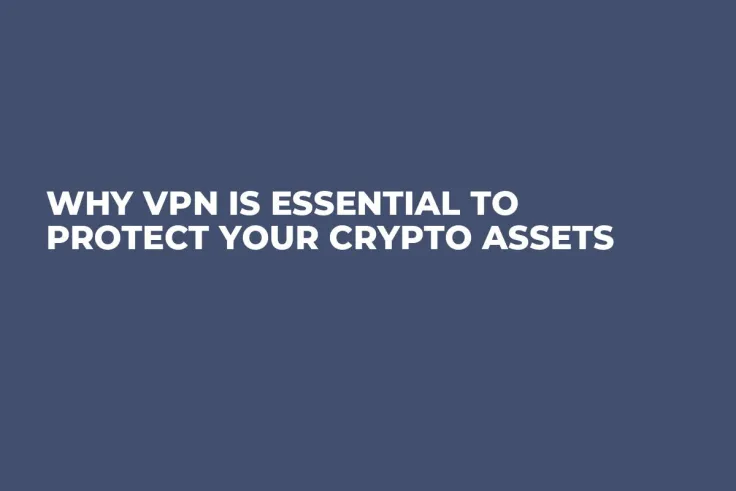
Disclaimer: The opinions expressed by our writers are their own and do not represent the views of U.Today. The financial and market information provided on U.Today is intended for informational purposes only. U.Today is not liable for any financial losses incurred while trading cryptocurrencies. Conduct your own research by contacting financial experts before making any investment decisions. We believe that all content is accurate as of the date of publication, but certain offers mentioned may no longer be available.
- Why VPN Security Matters for Crypto Investors
- Real-World Examples: Crypto Losses That VPNs Might Have Prevented
- Essential VPN Features for Crypto Security
- How to Use a VPN to Protect Crypto Assets
- What a VPN Can and Can’t Do for Crypto Security
- Best VPN Practices for Crypto Users
- Conclusion: Strengthen Your Crypto Security with a VPN
Learn how using a VPN can protect your crypto assets from hackers, phishing, and public Wi-Fi risks. Improve your security with VPN best practices.
Why a VPN Is Essential to Protect Your Crypto Assets
https://unsplash.com/photos/black-android-smartphone-on-black-textile-3PyBkxgTiL0
As cryptocurrency adoption grows, so do the risks. From phishing attacks to public Wi-Fi threats, crypto investors face a wide array of security challenges. One overlooked solution? A VPN for crypto.
A Virtual Private Network (VPN) encrypts your internet traffic and hides your IP address, making it harder for cybercriminals to steal your sensitive data. Whether you trade daily or just hold assets, using a VPN is a smart way to protect your crypto investments.
Why VPN Security Matters for Crypto Investors
Crypto Crime Is on the Rise
According to the FBI, internet crime losses in the U.S. topped $3.9 billion in 2023, with a significant portion tied to crypto-related fraud. Common vulnerabilities include:
- Unencrypted connections
- Unsafe exchanges
- Compromised public Wi-Fi access
Each of these can expose your crypto wallets and transaction details. VPNs reduce this risk by encrypting your online activity and preventing unauthorized data interception.
Key Benefits of Using a VPN for Crypto Transactions
Public Wi-Fi networks are common attack points. A VPN encrypts all data leaving your device, even on unsecured hotspots — protecting wallet logins and private keys.
Hackers often try to intercept transactions by hijacking communications between users and servers. VPNs prevent this by creating an encrypted tunnel for your connection.
VPNs replace your real IP address with one from a secure server, making it harder for attackers to trace or target your crypto activity.
Real-World Examples: Crypto Losses That VPNs Might Have Prevented
Exchange Hacks via Network Exploits
Several high-profile exchange breaches occurred due to unsecured data transmissions. While VPNs wouldn’t stop server-side hacks, they could have protected sensitive user traffic from being intercepted.
Public Wi-Fi Theft in California
In a documented case, a Los Angeles-based investor lost over $150,000 in crypto after logging into his wallet on hotel Wi-Fi. The attack leveraged session hijacking — a tactic that could have been prevented by using a VPN.
Essential VPN Features for Crypto Security
No-Logs Policy
Choose a VPN provider that doesn’t store your browsing data. This adds privacy and reduces the risk of third-party leaks.
Kill Switch
A kill switch automatically disables internet access if your VPN disconnects — preventing accidental IP exposure.
Strong Encryption Protocols
Look for VPNs using OpenVPN or WireGuard protocols for industry-standard security.
Multi-Factor Authentication (MFA)
Adds another security layer for accessing your VPN account — especially important if tied to crypto-related activity.
How to Use a VPN to Protect Crypto Assets
For Wallet Access
Use a VPN every time you log in to your wallet. This is especially critical if you use browser extensions or mobile apps.
For Crypto Exchange Transactions
Always access exchanges like Coinbase, Binance, or Kraken through a VPN — even on trusted home networks.
For Mobile Security
Install a mobile-friendly VPN app that works on iOS or Android. Use it when managing crypto on the go, particularly in unfamiliar environments.
What a VPN Can and Can’t Do for Crypto Security
VPNs are powerful tools, but they’re not complete solutions. Here’s a quick breakdown:
VPN Can Protect Against | VPN Cannot Protect Against |
Public Wi-Fi threats | Malware on your device |
IP tracking and geo-based attacks | Phishing emails or fake crypto sites |
Man-in-the-middle (MitM) attacks | Weak passwords or reused credentials |
For full protection, combine VPN use with secure wallets, 2FA, and smart digital hygiene.
Best VPN Practices for Crypto Users
- Always connect to your VPN before accessing wallets or exchanges
- Use a provider with a proven track record and independent audits
- Opt for free VPN options services if you’re just starting
- Regularly update both your VPN app and device OS
Conclusion: Strengthen Your Crypto Security with a VPN
Using a VPN to protect your crypto assets isn’t just a best practice — it’s becoming a necessity. With cyber threats growing more sophisticated, securing your internet connection is the first line of defense.
Whether you’re HODLing or day trading, a VPN for cryptocurrency can reduce exposure to common threats like IP tracking, data interception, and public Wi-Fi risks. Combine it with other security tools to build a strong, multi-layered defense for your digital wealth.

 Dan Burgin
Dan Burgin Vladislav Sopov
Vladislav Sopov